The House of Lords Select Committee on the Terminally Ill Adults (End of Life) Bill held its fifth and final day of oral evidence, during which it heard evidence from a range of pharmaceutical and legal experts.
My Death, My Decision and Humanists UK have raised concerns about the potential bias of the Committee and the oral evidence that has been chosen.
First session: Life-ending substances
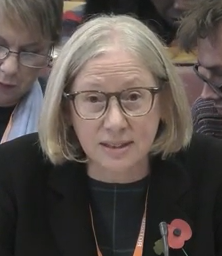
Rachel Arrundale, Interim Director of Partnerships at the Medicine and Healthcare Products Regulatory Agency (MHRA), told the Committee:
‘We would look at all the evidence that would be available. That would start from how the product is made, non-clinical data, lab studies, knowledge about the substances in use. It is our understanding that in most parts of the world, the substances that are in use are in fact licensed medicines, licensed for other purposes, other indications in the UK. So there may well be quite a lot of clinical data about those substances in use for other reasons.
‘And we can also draw on experience from other jurisdictions where they’ve been used. So a lot of information may well be available. My colleagues would assess that incredibly rigorously, as they do all of their other work, and if there were any suggestions that they weren’t safe or effective for the purpose intended, then the substance would not become an approved substance.’
Laura Wilson, Director for Scotland at the Royal Pharmaceutical Society, was asked by the Committee whether the life-ending medication should be put on the face of the Bill. She replied: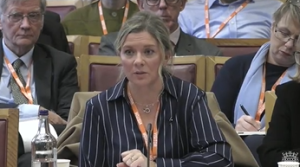
‘I think we would encourage, regardless of where it’s decided, that it is done by a panel of experts who are giving advice on the best substances to use based on the real-world evidence that we have. I suppose we would just exercise maybe a note of caution about it being in primary legislation around things like supply issues and the requirement to potentially have to change the approved substance at short notice if there are issues.’
A survey conducted by The Pharmaceutical Journal shows that 54% of pharmacists said they supported assisted dying in principle, with just 35% opposed.
Evidence to the Bill Committee in the Commons from DIGNITAS, the Swiss assisted dying centre, said that out of more than 3,900 cases of assisted dying ‘Every patient ingesting [the] lethal dosage passed away, with no instances of regaining consciousness.’
Second session: legal experts
 Sir Nicholas Mostyn, a former High Court judge who was diagnosed with Parkinson’s, told the Committee:
Sir Nicholas Mostyn, a former High Court judge who was diagnosed with Parkinson’s, told the Committee:
‘[The Bill] is overly complex but it is much better than the existing law, and I really do say a vote against this Bill is a vote in favour of the existing law, and you could hardly make up a law as malign as the existing law. I’ve got a right to kill myself, but I must do so entirely alone without any assistance. If somebody helps me, they probably won’t be prosecuted if they don’t know what they’re doing. But they probably will be prosecuted if they do know what they’re doing. You couldn’t really make it up.’
Sir Max Hill, former Director of Public Prosecutions, told the Committee:
‘This Bill is not a rush to legislate on a first global effort in relation to this. On the contrary, this has been advanced cautiously over a long period of time and many iterations in front of Parliament which members know about. We are following a sequence of models in many places around the world, 31 such models already exist, including a number of states in the USA, which is in double figures. This does not replicate any of them, pure and simple. It stands alone. It has learnt the lessons from all of those jurisdictions. It is in my view, in its current form, far more powerful than any of them.’
Third session: Health Minister and Chief Medical Officer
Stephen Kinnock, Minister of State at the Department for Health and Social Care (DHSC), told the committee:
‘The view of the government, in terms of workability, is that it strikes that balance between access and safety.’
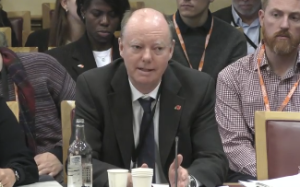 Sir Chris Witty, Chief Medical Officer at the Department of Health and Social Care, echoing some of the previous witnesses, warned against unwarranted complexity and bureaucracy in the assisted dying process.
Sir Chris Witty, Chief Medical Officer at the Department of Health and Social Care, echoing some of the previous witnesses, warned against unwarranted complexity and bureaucracy in the assisted dying process.
Last week, Sarah Sackman MP, Minister of State for Courts and Legal Services, said that if Parliament passes the Bill in its current form, ‘the Government considers it deliverable’.
Fourth session: Children’s Commissioner
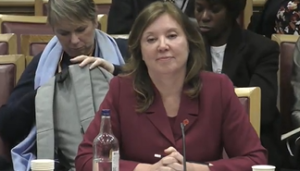
The fourth session heard from Dame Rachel de Souza. She told the Committee that, for people working in the health service, ‘18 isn’t really a thing’, and that the statutory duty for vulnerable young people was extended to 25 through education health care plans (EHCP). She said:
‘Those children are protected in law to 25 and I think that we’re kind of missing a trick by thinking somehow 18 is the cut off. I really do strongly think that.’
The Terminally Ill Adults (End of Life) Bill, as per the title of the Bill, is limited to adults over the age of 18. An amendment at Report Stage in the Commons states that no health professional shall raise assisted dying with a person under the age of 18. Already, this prevents a doctor or nurse from explaining to children whose parent is going through the process of an assisted death what is happening, including providing children with practical or emotional support.
Humanists UK and My Death, My Decision, are deeply disappointed that the Committee chose to receive evidence from someone whose remit focuses on people outside of the scope of the Bill, but not from terminally ill adults. Clare Turner, a mother of two with stage four breast cancer, and Louise Shackleton, whose husband went to Switzerland for an assisted death, have called this omission ‘outrageous’.
Fifth session: New Zealand
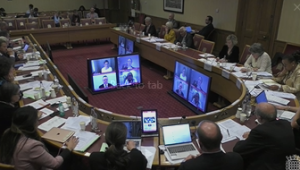
This was the only session to receive international evidence, despite a number of jurisdictions having assisted dying legal, safe, and working for decades. New Zealand legalised assisted dying in 2020 after a referendum saw 65% of citizens come out in favour. A systematic review of the law carried out in 2024 found that the service was ‘working well’ and ‘Families and patients expressed deep gratitude for the compassionate, person and family-centred, dignified, and timely care that practitioners are offering.’
Dr Jeanne Snelling, Senior Lecturer at the Faculty of Law at University of Otago, told the Committee:
‘The overwhelming feedback from patients and families was gratitude for the opportunity to access assisted dying and one of the interesting findings was that even families who may not initially be comfortable with their family member’s choice, generally became advocates for their family member. So that was another interesting finding for us was the journey that patients and families take together.’
Dr Jessica Young, Senior Research Fellow at the School of Health at Victoria University of Wellington, told the Committee:
‘They really get to the heart of why this law is important, that there are patients and families at the centre of this experience, and they are expressly grateful for this service. They feel a sense of relief that their loved one no longer has to suffer and that their suffering is also relieved.
‘They no longer have to watch their loved ones suffering in terms of the family experiences. They say things like “Mum was just so relieved, as soon as she got signed off you could just see that she was relaxed. She had the option. She had control. She no longer had to go down the dying route where she was gasping for air.” They could shortcut these experiences that they didn’t want at the end of life.’
How balanced is the Select Committee?
It has been reported that the Committee is weighted against assisted dying, with more opponents of legislation change than supporters. Analysis by Humanists UK and My Death, My Decision suggests that the experts so far called to give evidence consist overwhelmingly of those opposed to assisted dying.
Excluding from the Bill sponsors and ministers, of the 39 evidence-givers, only six were supportive of assisted dying, a third were against, and the rest were neutral.
Humanists UK raised how the Bishop of Newcastle declared ‘no conflict of interest’ in her role on the Committee despite receiving a salary and support from the Church of England, which has an organisational position opposing assisted dying.
What happens next?
The Select Committee will not produce a report or make recommendations but publish a brief summary of the evidence, which is due to be published on Friday. The Bill will then progress to its Committee Stage for detailed line-by-line scrutiny on Friday 14 November.
The Bill will need to complete its passage through parliament by Spring 2026.
Richy Thompson, Director of Public Affairs and Policy at Humanists UK, said:
‘The Select Committee has lacked the voices of those most directly affected: terminally ill people themselves. Without hearing from those facing the end of life, the Committee overlooked the urgency and personal realities behind the call for assisted dying. This has not been a fair and balanced process, as it deliberately did not include the perspectives of those whose rights and dignity are at stake.
‘We need an assisted dying law to give a compassionate choice to those who are suffering unbearably at the end of life. No one should be forced to endure needless pain or travel abroad to die with dignity. With robust safeguards and proper oversight, we can create a law that protects the vulnerable while respecting individual autonomy and humanity.’
Dave Sowry, Board Member of My Death, My Decision, said:
‘The Committee waited until the very last session to hear international evidence. The final session heard from experts from New Zealand, where strong safeguards have protected vulnerable people while enabling dying people facing intolerable suffering to make compassionate end-of-life choices. The data shows that fears of widespread abuse are unfounded and that legal, regulated systems provide greater protection than the status quo in this country.
‘Nevertheless, it is deeply disappointing that the Committee has chosen not to hear directly from terminally ill people or from families who have supported loved ones through assisted deaths abroad. Their lived experience is vital to understanding the real-world impact of our current law. Without their voices, this inquiry risks being one-sided and missing the opportunity to truly reflect the needs and wishes of those most affected.’
Notes
Members of the MDMD team, as well as individuals affected by the current law on assisted dying, are available for interview upon request
For further comment or information, media should contact Nathan Stilwell at nathan.stilwell@mydeath-mydecision.org.uk or phone 07456200033. (media only)
Media can use the following press images and videos, as long as they are attributed to “My Death, My Decision”.
My Death, My Decision is a grassroots campaign group that wants the law in England and Wales to allow mentally competent adults who are terminally ill or intolerably suffering from an incurable condition the option of a legal, safe, and compassionate assisted death. With the support of over 3,000 members and supporters, we advocate for an evidence-based law that would balance individual choice alongside robust safeguards and finally give the people of England and Wales choice at the end of their lives.

